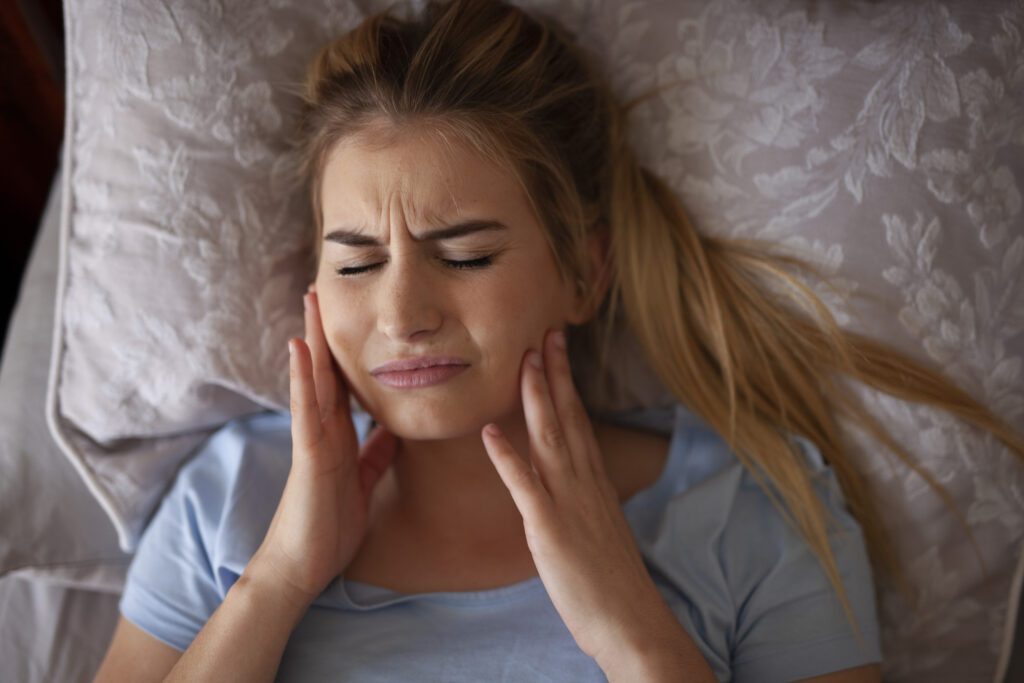If you wake up with jaw pain and headaches, you may have a TMJ problem. The temporomandibular joints (TMJ) are sliding hinges that connect the skull to the jaw. When you injure or put stress on these joints, you can experience TMJ disorders (TMD). We recommend TMJ treatment in Nederland, TX, to restore mouth function and comfort.
TMJ dysfunction leads to painful problems, including nightly teeth grinding, headaches, and tooth wear. Treating TMJ disorders sooner rather than later can prevent permanent issues.

Common Signs of TMD
For some patients, TMD may be difficult to notice. However, there are some tell-tale symptoms of TMJ disorders:
- Teeth clenching and grinding (bruxism)
- Jaw pain
- Headaches and migraines
- Earaches
- Tooth wear, chips, and cracks
- Jaw popping and clicking
- Pain when biting and chewing
Problems like teeth clenching and grinding often occur during sleep or unconsciously during the day. Noticing pain or strain in the jaw, morning headaches, and tooth pain can help you get the necessary care.
Additionally, because the TMJ aids in biting and chewing, TMJ problems can impact your diet. Eating crunchy or chewy foods may be harder when you experience jaw and facial pain.
TMJ Treatment in Nederland, TX
As soon as you notice TMJ dysfunction, contact our office. We will take X-rays to get a complete picture of your teeth, gums, and jaw. These X-rays can show how your bite comes together, signs of tooth wear, and more.
If you have TMD, our office may recommend one or more of these TMJ treatments:
Nightguard
A TMJ nightguard is an effective solution for teeth clenching and grinding, morning headaches, and jaw pain. Nightguards use acrylic to cover the upper or lower teeth. Because of the hard plastic materials, these oral appliances reduce the risk of unconsciously biting or chewing on the mouthguard.
The nightguard helps change your jaw position, bringing your lower jaw forward. Additionally, the nightguard protects your teeth against further tooth wear, chips, or cracks from constant teeth clenching and grinding.
In our office, we will measure your bite pressure to determine whether your bite is uneven. We will take impressions of your teeth and send them to a lab, where technicians create the nightguard. Then, we will ensure the splint fits your teeth comfortably.
Bite Equilibration
Did you know that crooked teeth can contribute to TMJ disorders? An unbalanced or bad bite puts pressure on the TMJ and jaw joints. Crooked teeth are a TMD risk factor.
Clear braces, dental crowns, and other treatments can create a balanced bite. With braces, we can treat crooked and misaligned teeth. Dental crowns, or caps, can cover one or more worn or broken teeth. Crowns add tooth structure to ensure your teeth come together properly.
Lifestyle Changes
Stress is a major contributor to TMJ flare-ups. Reducing stress, whether through medication, relaxation techniques, or other means, can reduce symptoms. Using a heating pad on your jaw can also reduce facial pain. We only recommend ice packs on your jaw if you have a new injury. Otherwise, heat will relax your muscles.
We may also recommend eating soft foods for several weeks as you begin TMJ treatment. Softer foods reduce pressure on your teeth and TMJ.
Physical Therapy
We often recommend physical therapy to help you reduce muscle tension in the upper body. A physical therapist will use massage and teach you exercises to improve your posture. Regular exercise for your arms, back, shoulders and face reduces muscle stiffness.
Surgery
We only recommend surgery for patients with severe TMJ problems. If you have a dislocated jaw, torn ligament, or other joint or muscle issue, our office will refer you to a surgeon. Maxillofacial surgery will permanently improve your TMJ function. Types of TMJ surgery can include open joint surgery, injecting fluid into the joint, or removing scar tissue.
TMJ Treatment FAQs
Discover more about TMJ treatment in our Nederland, TX office with answers to these common questions:
What are the risk factors for TMJ?
Risk factors that increase your chance of developing a TMJ disorder include:
- Anxiety
- Stress
- Arthritis
- Jaw injury
- Genetics
In some cases, you can control your risk of developing TMD. Others, however, are unavoidable. Visiting a dentist to treat painful symptoms can keep your TMJ disorder in check.
What worsens TMJ disorders?
Several habits can worsen your TMJ symptoms:
- Chewing gum
- Crunching on ice
- Using teeth as tools
- Eating hard and crunchy foods
Stop these bad habits to reduce jaw tension and pressure on your bite. Sometimes, eating soft foods for some time can help reduce strain on your joints and muscles.
How can I relax my jaw?
When you experience jaw pain, relaxing your jaw can help relieve it. To relax your jaw, gently place the tip of your tongue on the roof of your mouth, ensuring your teeth do not touch. Relaxing your jaw when you notice it tense up can reduce pressure on your facial muscles.
Can I wear a sports mouthguard for my TMJ disorder?
No, sports mouthguards are too bulky and do not provide proper protection for teeth clenching and grinding. Sports mouthguards are meant to cover the front of the top teeth. Custom-made sports mouthguards are made of rubbery plastic that encourages teeth clenching. These mouthguards can also easily fall out of your mouth if worn during sleep.
Instead, get a TMJ nightguard. This custom-fitted oral appliance will protect your teeth and reduce bruxism.
Why does TMD cause ear pain?
Yes, in some cases, you may have ear pain due to TMD. The temporomandibular joints are located close to the ear canal. Pain from the TMJ can radiate throughout the face and affect the ears. As a result, you can experience your ears ringing and earaches.
How does posture impact the TMJ?
Yes, poor posture can worsen TMD symptoms. Hunching over with a forward head posture affects your jaw position. This shifts the lower jaw forward, impacting the bite. When your head, neck, and shoulders are properly aligned, you have less pressure on the joints or muscles.
When sitting or standing, keep your shoulders away from your ears. To reduce jaw clenching, keep your teeth apart. Place the tip of your tongue on the roof of your mouth.
Treat TMJ Today
Stop chronic migraines, jaw pain, and other painful TMJ symptoms. Schedule a dental appointment at Coastal Dental Care today or call 409-215-2035. Let us know if you have any questions about TMJ treatment. We’re here to help.
